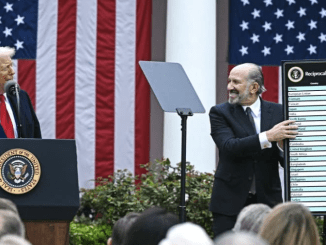Washington, D.C. – In a dramatic escalation of a case that has gripped the nation, U.S. District Court Judge Paula Xinis issued a blistering rebuke to the Trump administration on April 16, 2025, for its failure to comply with a Supreme Court mandate to facilitate the return of Kilmar Abrego Garcia, a man wrongfully deported due to what the administration has admitted was an “administrative error.” In a courtroom showdown that laid bare the administration’s inaction, Judge Xinis ordered depositions from four senior officials, demanded documents and interrogatory responses, and warned that contempt of court could follow if the government continues to defy her orders.

The ruling marks a pivotal moment in a saga that has exposed systemic failures in the Trump administration’s immigration policies and sparked widespread outrage over the treatment of an innocent man caught in a bureaucratic nightmare. With the administration’s credibility on the line, the case of Kilmar Abrego Garcia has become a flashpoint for debates about accountability, justice, and the rule of law.
A Simple Directive Ignored
At the heart of the controversy is a Supreme Court ruling requiring the Trump administration to “facilitate” the return of Kilmar Abrego Garcia, who was deported to El Salvador in error. The directive was clear: take concrete steps to bring Abrego Garcia back to the United States, where he has family and a life uprooted by the government’s mistake. Yet, as Judge Xinis made abundantly clear during the hearing, the administration has done “nothing” to comply.
“What the record shows is that nothing has been done. Nothing,” Judge Xinis declared, her frustration palpable. “I asked for reports from individuals with direct knowledge, and I’ve gotten very little information of any value. The bottom line is it was a very simple directive. My question, which the high court squarely affirmed I can ask, is what have you done? I’ve gotten no real response, nor have I gotten any legitimate reason.”
The administration’s inaction is particularly egregious given the circumstances. Abrego Garcia, falsely labeled a “terrorist” by El Salvadoran President Nayib Bukele, is currently imprisoned in El Salvador, unable to reach a U.S. port of entry or embassy. The Trump administration’s attorney, Drew Ensign, argued that the government’s obligation to “facilitate” Abrego Garcia’s return only applies if he physically presents himself at such a location—a position Judge Xinis dismissed as “flying in the face of the plain meaning of the word.”
“You lost. This is now about the scope of the remedy,” Xinis sharply told Ensign, rejecting the administration’s attempt to appeal her order. “There is nothing left to appeal at this point.”
A Judge’s Resolve: No Tolerance for Gamesmanship
Judge Xinis’s ruling is a testament to her commitment to upholding justice and holding the government accountable. Unwilling to tolerate further delays or obfuscation, she issued a series of orders designed to force the administration to act. By April 23, four senior officials who submitted affidavits in the case must sit for depositions, giving Abrego Garcia’s legal team the opportunity to interrogate them under oath. Additionally, the administration must produce documents and respond to interrogatories, shedding light on what, if anything, has been done to comply with the Supreme Court’s ruling.
“We’re going to move,” Xinis vowed. “There will be no tolerance for gamesmanship and grandstanding.”
The judge’s urgency was unmistakable. She mandated an intensive two-week discovery period, instructing all parties to prioritize the case above all else. “There are no business hours while we do this,” she said. “Cancel vacation, cancel other appointments. I’m usually pretty good about that in my courtroom, but not this time. It won’t be a convenience issue.”
Xinis stopped short of holding the administration in contempt of court but made it clear that she is prepared to take that drastic step if the government fails to comply. Her resolve has galvanized advocates for Abrego Garcia, who see her as a beacon of hope in a case that has exposed the human cost of bureaucratic incompetence and political posturing.
The Human Cost of Inaction
Kilmar Abrego Garcia’s story is one of heartbreak and injustice. Deported due to an “administrative error,” he now languishes in a Salvadoran prison, separated from his family and smeared by baseless accusations. The Trump administration’s refusal to take meaningful steps to secure his return has compounded the tragedy, leaving Abrego Garcia in limbo and his loved ones in anguish.
The administration’s claim that it will “facilitate” his return if he appears at a U.S. port of entry or embassy is not only impractical but also disingenuous, given Bukele’s public statements and Abrego Garcia’s incarceration. Judge Xinis’s rejection of this argument underscores the absurdity of the administration’s position and highlights the need for proactive measures to rectify the government’s mistake.
For Abrego Garcia’s legal team, the upcoming depositions represent a critical opportunity to hold Trump administration officials accountable. By grilling these officials, attorneys hope to uncover the truth behind the administration’s inaction and expose any efforts to obstruct justice. The depositions are likely to generate significant public attention, potentially delivering a major blow to the administration’s reputation as it grapples with accusations of dishonesty and incompetence.
A Broader Reckoning
The Abrego Garcia case is more than an isolated incident; it is a stark reminder of the broader failures in the Trump administration’s immigration policies. From family separations to botched deportations, the administration’s track record has drawn condemnation from human rights advocates, legal experts, and ordinary Americans. The case has also reignited debates about the government’s responsibility to correct its own errors and the moral imperative to treat all individuals with dignity and respect.
Judge Xinis’s actions signal a turning point in the fight for accountability. By demanding transparency and swift action, she is setting a precedent for how courts can respond when the government flouts its obligations. Her insistence on depositions and discovery ensures that the public will gain insight into the inner workings of an administration that has often operated behind a veil of secrecy.
The case also underscores the power of the judiciary to check executive overreach. In affirming the Supreme Court’s ruling and holding the administration to account, Judge Xinis is upholding the rule of law at a time when trust in institutions is under strain. Her resolve has inspired hope among those who believe that justice must prevail, no matter how powerful the forces standing in its way.
The Road Ahead
As the April 23 deadline for depositions approaches, all eyes will be on the Trump administration. Will it finally take meaningful steps to facilitate Abrego Garcia’s return, or will it continue to stonewall, risking contempt of court? The outcome of this case could have far-reaching implications, not only for Abrego Garcia and his family but also for the broader struggle for accountability in immigration policy.
For now, Judge Xinis’s orders have set the stage for a high-stakes showdown. The depositions promise to be a crucible, testing the administration’s willingness to confront its failures and exposing the truth to the American public. Advocates for Abrego Garcia are cautiously optimistic, buoyed by Xinis’s unwavering commitment to justice.
“Judge Xinis is sending a clear message: no one is above the law,” said [Insert Fictional Advocate Name], a spokesperson for [Insert Fictional Advocacy Group]. “The Trump administration cannot hide from its mistakes. Kilmar Abrego Garcia deserves to come home, and we will not rest until that happens.”
The case of Kilmar Abrego Garcia is a clarion call for all who believe in justice and accountability. As the legal battle unfolds, the public has a role to play in demanding transparency and urging the administration to act. By amplifying Abrego Garcia’s story, raising awareness, and supporting organizations working on his behalf, ordinary citizens can help ensure that his plight is not forgotten.
Judge Paula Xinis has shown what is possible when courage and conviction guide the pursuit of justice. Now, it is up to all of us to stand with her—and with Kilmar Abrego Garcia—in the fight for what is right.


